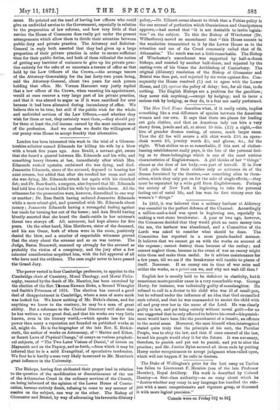The Bishops, having first abdicated their proper lead in relation
to the question of the modification or discontinuance of the use of the Athanasian Creed in the ordinary services of the Church, on being informed of the opinion of the Lower House of Convo- -cation, became entirely dumb, refusing to come to any manner of resolve on the subject, one way or the other. The Bishop of Gloucester and Bristol, by way of advocating his favourite dilatory
policy,—Dr. Ellicott seems almost to think that a Fabian policy is the one counsel of perfection which Omniscience and Omnipotence approve,—had moved that "it is not desirable to invite legisla- tion" on the subject. To this the Bishop of Winchester (Dr. Wilberforce) moved an amendment that "this House assents to the resolution transmitted to it by the Lower House as to the retention and use of the Creed commonly called that of St. Athanasius." The result was not a little remarkable. The Bishop of Winchester's amendment was supported by half-a-dozen bishops, and resisted by another half-dozen, and rejected by the casting-vote of his Grace the Archbishop of Canterbury. The original (dilatory) resolution of the Bishop of Gloucester and Bristol was then put, and rejected by six votes against five. Con- sequently the House resolved (1) not to agree with the Lower House, and (2) against the policy of delay; but, for all that, to do nothing. The English Bishops are a problem for the gamblers ; they never risk anything,—except by hedging; and to incur a serious risk by hedging, as they do, is a feat not easily performed.


































 Previous page
Previous page